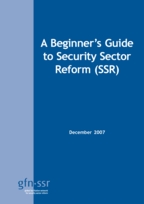Security sector reform
Unprofessional, inefficient and unaccountable security institutions threaten human rights, democratic politics and the achievement of poverty reduction goals. In countries at risk of conflict or in post-conflict contexts, security sector reform (SSR) can be of central importance for stability or conflict prevention. Sometimes SSR is referred to as security sector transformation (SST) or security sector governance (SSG).
The security sector can be defined in a variety of ways. The resources below cover the military, paramilitary, police, intelligence, and border and customs authorities. The resources focus on making security institutions appropriate, affordable and accountable to democratic oversight and control.
Page contents
- Where is a good place to start?
- Key texts on security sector reform
- Civilian oversight and accountability
- Financial management of the security sector
- What other resources are available within the Topic Guides?
- Additional information resources
Where is a good place to start?
Department for International Development, Ministry of Defence and Foreign Commonwealth Office, n.d., ‘GCPP SSR Strategy 2004-2005’, draft report, DFID, Ministry of Defence and Foreign and Commonwealth Office, London
(document summary available shortly)
Organisation for Economic Co-operation and Development, 2004, ‘Security System Reform and Governance: Policy and Good Practice’, Development Assistance Committee (DAC) Guidelines and Reference Document, Organisation for Economic Co-operation and Development (OECD), Paris
How do you foster through governance reforms a secure environment that is conducive to poverty reduction and sustainable development? What are the key components of security? These are questions that are addressed in this publication by the Development Assistance Committee (DAC) of the Organisation for Economic Co-operation and Development (OECD). The research suggests that the traditional concept of security is being redefined. The document sets out the key concepts of security system reform (SSR) and suggests ways to support it in developing countries.
Key texts on security sector reform
Recent years have seen the growth of a huge literature on security sector reform. The following documents are a short selection covering both practical guidance and analyses of the wider context and the politics of reform.
Evans R. 2002, ‘Donor Perspective on Security Sector Reform as a Governance Issue’ paper prepared for The 5th International Security Forum in Zurich, October 2002
This paper, prepared for the Fifth International Security Forum, provides a perspective from recent experience of how donors engage in security sector governance work. It contains an overview of the content and process of donor engagement in security sector reform and the linkage to broader governance issues. It addresses the need for a co-ordinated approach within government amongst stakeholders’ ministries and departments and the challenges involved in making this a reality.
Full document: available online
Cooper, N. and Pugh, M., 2002, ‘Security Sector Transformation in Post Conflict Societies’, Working Paper no. 5, Centre for Defence Studies, London. This paper, from the Centre for Defence Studies, argues that wider and more innovative reform – security sector ‘transformation’ – would be a way of addressing the issues of socio-political dynamics of civil-military relations, as well as taking account of the political economy of conflict. It concludes with a number of detailed recommendations that the UK might address and points out that, while in developed states there are signs that policy coordination has increased, there is still a risk that policy can be co-opted by special interest groups, notably military-industrial actors, whose interests may not always coincide with security sector reform in conflict prone societies.
Cawthra, G. and Luckham, R., 2003, ‘Democratic Control and the Security Sector. The Scope of Transformation and its Limits’ in Governing Insecurity: Democratic Control of Military and Security Establishments in Transitional Democracies, eds G. Cawthra and R. Luckham, Zed Books, London
How do you ensure democratic control of military and security institutions? How do transform them from agents of insecurity to be agents of security for the people of their country? This collaborative research from the Institute of Development Studies, Sussex, Witwatersrand University and other partner institutions examines the governance of security in developing and former communist countries and makes recommendations as to an emerging best practice.
Full document: available via document delivery. Please see document summary.
Woodward, S., 2003, ‘In Whose Interest is Security Sector Reform? Lessons from the Balkans’, in Governing Insecurity: Democratic Control of Military and Security Establishments in Transitional Democracies, eds G. Cawthra and R. Luckham, Zed Books, London
Extraordinary resources and efforts are being invested in security sector reform (SSR) in South-eastern Europe. However, whose interests are served by SSR activities in the region? This chapter from a book, published by Zed Books, claims that temporary foreign actors are driving the demand, financing and mechanisms of accountability for SSR. Instead of turning authoritarian regimes into democratic regimes, in which security is right for the citizens, external actors are motivated by a policy of ‘containment’, which aims to protect Western European countries against the effects of regional instability.
Full document: available via document delivery. Please see document summary.
Ball, N., Bouta, T., and van de Goor, L., 2003, ‘Enhancing Democratic Governance of the Security Sector: An Institutional Assessment Framework’, Netherlands Institute of International Relations
In recent years, security sector reform has become an important feature of the international development agenda. Yet there are almost no tools to help governments assess the quality of democratic security sector governance, and plan and implement sector reforms. This framework, from the Clingendael Institute, aims to fill that gap by identifying security sector governance needs and developing a strategy to address them.
Full document: available online
Greene, O., 2003, ‘Security Sector Reform, Conflict Prevention and Regional Perspectives’, Journal of Security Sector Management, Vol. 1, No. 1
What is the added-value of regional or sub-regional approaches to security sector reform (SSR) and conflict prevention strategies? This article, published in the Journal of Security Sector Management, argues that the UK government and other donors should assist in establishing or further developing regional and sub-regional SSR programmes due to the cross-border nature of many security challenges. Equally, donors should strengthen their ties with established regional mechanisms and institutions to facilitate links between SSR programmes and wider conflict prevention activities.
Full document: available online
The following web-based handbook looks in greater detail at various aspects of SSR:
Ball, N. and Fayemi, K. (eds), 2005, Security Sector Governance: A Handbook, Lagos/Washington DC
Full document: available online
Civilian oversight and accountability
Civilian oversight and accountability is needed to ensure that state-military relations are conducive to democratic politics and that human security is promoted as well as national security. This can be difficult to achieve where there are complex technical issues at stake, vested interests and cultures of secrecy. Approaches in this area often include building the capacity and expertise of a variety of state institutions, including governments, legislatures, judicial institutions, ombudsmen and complaints bodies. Non-state actors can also play an important role and some approaches seek to strengthen the capacity of civil society watchdog organisations.
Born, H., Fluri, P., and Johnsson, A. (eds), 2003, ‘Parliamentary Oversight of the Security Sector: Principles, Mechanisms and Practices’, Handbook for Parliamentarians No. 5, Inter-Parliamentary Union and Geneva Centre for the Democratic Control of Armed Forces
Why is parliamentary oversight of the security sector necessary? What is the role of parliament and how is it best performed? This handbook by the Inter-Parliamentary Union (IPU) and the Geneva Centre for the Democratic Control of Armed Forces (DCAF) provides a comprehensive picture of current security issues and deals exhaustively with all aspects of parliamentary oversight of the security sector.
Full document: available online
Sammonds, N., 2000, ‘A Need to Know: The Struggle for Democratic, Civilian Oversight of the Security Sector in Commonwealth Countries’, Commonwealth Policy Studies Unit, London
This extensively referenced paper, the first survey of Commonwealth Parliaments’ security sector committees, is produced by the Commonwealth Studies Unit. It emphasises the need for democratic and civilian oversight of security forces leading to an effective security sector, good governance and human rights protection. The paper highlights an ambitious range of country studies. The rationale is to provide a spectrum of nations and socio-economic contexts. Sri Lanka, Nigeria, South Africa, Barbados and St Lucia are reviewed in detail.
Full document: available online
Caparini, M. 2004, ‘Civil Society and Democratic Oversight of the Security Sector: A Preliminary Investigation’, Working paper no. 132, Geneva Centre for the Democratic Control of Armed Forces, Geneva
What does the concept of civil society bring to our understanding of security sector reform (SSR) and inversely, how does SSR further our understanding of civil society? This working paper, published by the Geneva Centre for the Democratic Control of the Armed Force (DCAF), argues that an SSR perspective enables an understanding of the relationship between civil society actors and the various sectors of security policy. Inversely, an examination of SRR through the prism of civil society emphasises issues of accountability, participation, and ultimately, the legitimacy of governance.
Full document: available online
Financial management of the security sector
Reform of inefficient and unaccountable security sector expenditure is important for democratic control and for effective use of public finances. This includes making sure expenditure is transparent and within the budget, and allocating resources according to priorities within the security sector and between sectors. ‘Right-sizing’ the security sector aims to ensure that expenditure is appropriate, and does not divert resources from other areas such as development. Tackling corruption in security sector expenditure is important for bringing the sector under civilian control, and for reducing the informal political power of security actors.
Ball, N. and Holmes, M., 2002, ‘Integrating Defence Into Public Expenditure Work’, Department for International Development, London
The importance of security to development has become widely recognised in recent years. Yet donor involvement in providing support to the security sector lacks a coherent framework, particularly in the area of defence. This report, commissioned by the UK’s Department for International Development (DFID), argues that donors need to accept security and the defence sector as one core component of a well functioning public sector and adjust their policies accordingly. The report presents options for the World Bank and other donors for incorporating the defence sector into public expenditure work.
Full document: available online
Section Four of the IPU/DCAF handbook below provides information about promoting parliamentary control over security budgets.
Born, H., Fluri, P., and Johnsson, A. (eds), 2003, Parliamentary Oversight of the Security Sector: Principles, Mechanisms and Practices, Handbook for Parliamentarians No. 5, IPU and DCAF
Why is parliamentary oversight of the security sector necessary? What is the role of parliament and how is it best performed? This handbook by the Inter-Parliamentary Union (IPU) and the Geneva Centre for the Democratic Control of Armed Forces (DCAF) provides a comprehensive picture of current security issues and deals exhaustively with all aspects of parliamentary oversight of the security sector.
Full document: available online
What other resources are available within the Topic Guides?
Users interested in SSR may also be interested in the resources on police reform in this topic guide.
Additional information resources
Bonn International Centre for Conversion (BICC)
BICC is an NGO working to promote peace and development through the transformation of military-related processes, functions, assets and structures. It produces online papers on a broad range of issues relevant to SSR, including economics, small arms, voice and accountability, and preventative conversion.
Centre for Defence Studies, Kings College London
CDS carries out research on British, European and International security issues, including work with the British Government.
Global Facilitation Network for Security Sector Reform (GFN-SSR)
The GFN-SSR is a focal point for an extensive network of state and non-state actors working in security sector reform, facilitating links and building support networks enabling decision-makers, practitioners, and beneficiaries to access, share, and assess the latest theory, research, and best practice from around the world.
Geneva Centre for the Democratic Control of Armed Forces (DCAF)
DCAF is an international foundation made up of member governments, aiming to support security sector reform and the strengthening of democratic governance of the security sector. It carries out networking activities, provides support to parliaments and produces lessons learned.
Institute for Security Studies, Pretoria
This research institute based in South Africa carries out research, consultancy and training, and houses many online documents on security and justice across Southern Africa.









